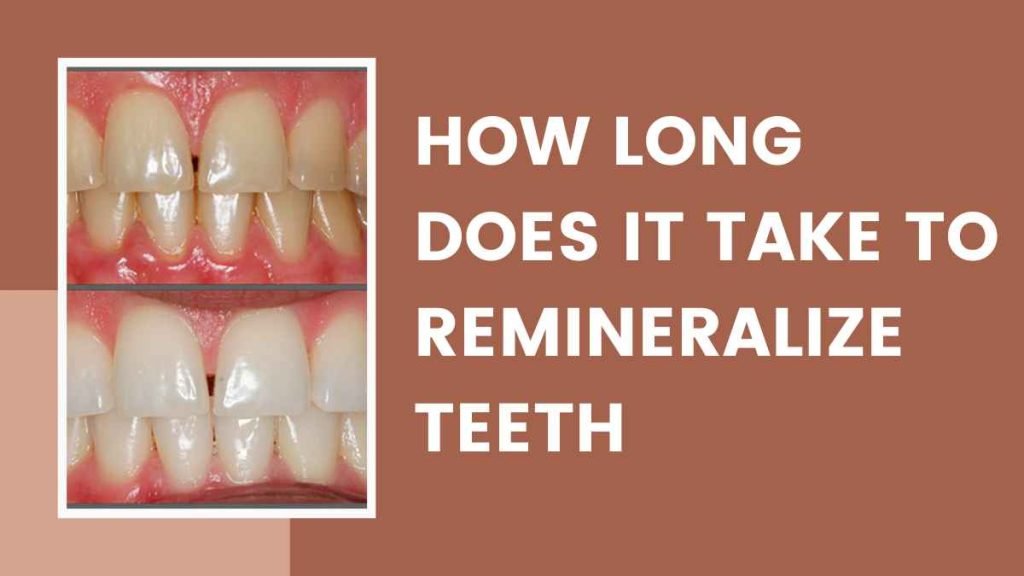How Long Does It Take to Remineralize Teeth! When it comes to oral health, one of the key concerns is maintaining the strength and integrity of our teeth. Dental issues like demineralization can weaken the teeth, leading to various problems. However, the good news is that tooth remineralization is a natural process that can help restore the minerals lost from the teeth. But just how long does it take to remineralize teeth effectively? In this comprehensive guide, we will explore How Long Does It Take to Remineralize Teeth. Here we will delve into the science behind tooth remineralization, step-by-step methods, the duration it takes, common mistakes to avoid, and much more.
Table of Contents
Introduction
Tooth remineralization is the process of restoring minerals like calcium, phosphate, and fluoride to the tooth enamel. Enamel, the outer layer of our teeth, can lose minerals due to factors such as poor oral hygiene, acidic foods, and sugary beverages. When the enamel loses minerals, it becomes weaker and more susceptible to decay. Remineralization helps strengthen the enamel, making the teeth more resilient against cavities and other dental problems.
What Is Tooth Remineralization?
Tooth remineralization is a natural repair process that occurs when the lost minerals are replaced with the help of saliva and fluoride. Saliva contains essential minerals that aid in rebuilding the enamel. Fluoride, a mineral found in water and toothpaste, also plays a crucial role in remineralization by making the enamel more resistant to acid attacks.
How to Remineralize Teeth: A Step-by-Step Guide
Maintain Proper Oral Hygiene
Brush your teeth at least twice a day with fluoride toothpaste and use dental floss to clean between your teeth. Proper oral hygiene is the foundation of tooth remineralization.
Use Fluoride Toothpaste and Mouthwash
Fluoride toothpaste helps in replenishing lost minerals. Additionally, using a fluoride mouthwash can provide an extra layer of protection against demineralization.
Balanced Diet
Consume a balanced diet rich in calcium, phosphates, and vitamins. These nutrients are essential for strengthening teeth and promoting remineralization.
Avoid Sugary and Acidic Foods
Sugary and acidic foods can erode tooth enamel. Limit your intake of sugary snacks and acidic beverages to protect your teeth from demineralization.
Regular Dental Check-ups
Schedule regular dental check-ups to detect early signs of demineralization. Your dentist can provide professional advice and treatments to aid in remineralization.
How Long Does It Take to Remineralize Teeth?
The duration it takes to remineralize teeth varies from person to person and depends on the extent of demineralization. Minor cases of demineralization can show improvement within a few weeks to a couple of months with proper oral care. However, more severe cases may take several months to a year to show significant results.

What Causes Tooth Demineralization?
Several factors can lead to tooth demineralization, including:
- Poor Oral Hygiene: Inadequate brushing and flossing allow plaque to build up, leading to demineralization.
- Acidic Foods and Drinks: Consuming foods and beverages high in acid content can wear down tooth enamel.
- Dry Mouth: Saliva plays a vital role in remineralization. A dry mouth can hinder this natural process.
- Medical Conditions: Certain medical conditions and medications can contribute to demineralization.
Signs of Tooth Remineralization
Wondering if your teeth are remineralizing? Look out for these signs:
- Reduced Tooth Sensitivity: Remineralization strengthens the enamel, reducing sensitivity to hot, cold, or sweet foods.
- Whiter Teeth: As enamel strengthens, teeth may appear whiter and more lustrous.
- Smooth Enamel: Remineralization can make the enamel smoother and less porous, reducing the risk of cavities.
Common Mistakes to Avoid
To ensure effective remineralization, avoid these common mistakes:
- Neglecting Oral Hygiene: Inconsistent brushing and flossing hinder the remineralization process.
- Excessive Consumption of Acidic Foods: Limit the intake of acidic foods and beverages to prevent enamel erosion.
- Ignoring Dental Issues: Delaying dental treatments can worsen demineralization. Address dental problems promptly.
Tips and Tricks for Effective Remineralization
- Drink Fluoridated Water: Fluoridated water helps in remineralization and strengthens tooth enamel.
- Chew Sugar-Free Gum: Chewing sugar-free gum stimulates saliva production, aiding in remineralization.
- Calcium and Vitamin D Supplements: Consult your dentist about calcium and vitamin D supplements to support remineralization.
- Oil Pulling: Some studies suggest that oil pulling with coconut oil can promote oral health, including remineralization.
Facts About Tooth Remineralization
- Natural Process: Remineralization is a natural process that the body undergoes to repair minor enamel damage.
- Prevents Cavities: Strengthening enamel through remineralization helps prevent cavity formation.
- Importance of Fluoride: Fluoride is a key mineral in remineralization, making enamel more resistant to acid attacks.
- Individual Variations: The rate of remineralization varies among individuals based on genetics, diet, and oral hygiene habits.
Conclusion
In conclusion of How Long Does It Take to Remineralize Teeth, tooth remineralization is a vital process for maintaining optimal oral health. By following proper oral hygiene practices, adopting a balanced diet, and avoiding harmful habits, you can support and enhance the natural remineralization of your teeth. Remember, consistency is key; regular dental check-ups and a mindful approach to oral care can go a long way in preserving your precious smile. Here you can checkout that How Long Does It Take to Get White Teeth.
FAQs About How Long Does It Take to Remineralize Teeth
How long does it take to see results from remineralization?
Results vary based on the extent of demineralization and individual factors. Minor cases may show improvement within a few weeks, while severe cases may take several months to a year.
Can remineralization reverse cavities?
Remineralization can arrest the progression of early-stage cavities by strengthening the enamel. However, advanced cavities may require dental fillings.
Is fluoride essential for remineralization?
Yes, fluoride is a crucial mineral for remineralization. It makes the enamel more resistant to acid attacks, preventing further demineralization.
Are there natural ways to promote remineralization?
Maintaining good oral hygiene, consuming a balanced diet rich in calcium and vitamins, and staying hydrated can naturally promote remineralization. Some studies suggest oil pulling with coconut oil may also be beneficial.
Can children undergo remineralization?
Yes, children can undergo remineralization. In fact, it is particularly important for children as their developing teeth are more susceptible to demineralization.
How often should I visit the dentist for remineralization treatments?
Regular dental check-ups are essential to monitor remineralization progress and address any dental issues promptly. Your dentist can recommend specific treatments and preventive measures.
Is remineralization a one-time process?
Remineralization is an ongoing process. Maintaining good oral hygiene and a healthy diet is crucial to continue supporting the remineralization of teeth throughout life.


